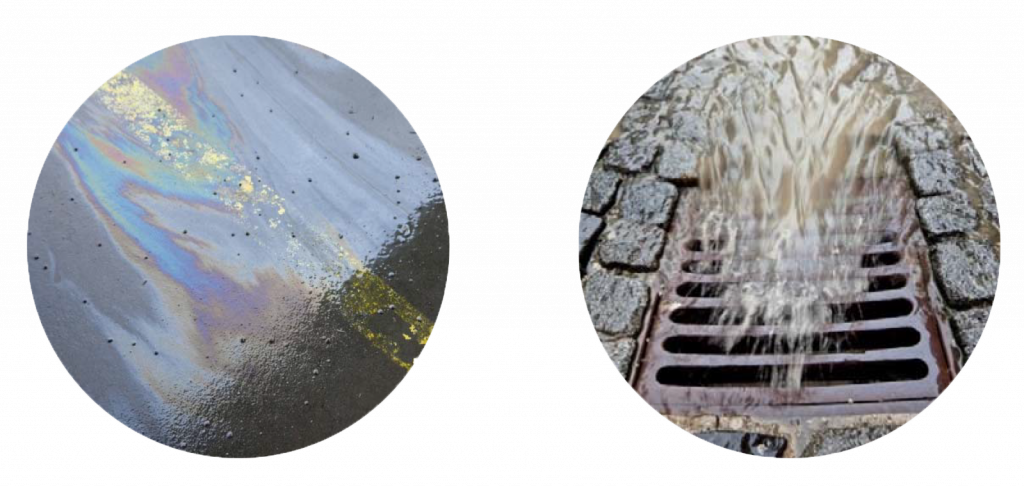Help Us Prevent Stormwater Pollution in Sudbury!
 Everyone needs to do their part to reach our goal of clean healthy waterways in Sudbury. Our storm drains are connected directly to our wetlands, lakes, streams, and rivers. Unlike water that is used in your home or business, water that goes down a storm drain does not get treated at a sanitation facility.
Everyone needs to do their part to reach our goal of clean healthy waterways in Sudbury. Our storm drains are connected directly to our wetlands, lakes, streams, and rivers. Unlike water that is used in your home or business, water that goes down a storm drain does not get treated at a sanitation facility.
Whatever flows down a storm drain comes out in a nearby waterway. As stormwater flows over land, down streets, and into storm drains, it picks up pollutants such as litter, lawn fertilizers, oil leaks from cars, winter sand, and road salt, and pet waste. These pollutants can flow directly into our waterways.
Tips to Reduce Stormwater Pollution
- Only rain belongs in the drain. Don’t dump anything down storm drains. Be sure to clear away leaves and debris.
- Wash your car over your lawn or gravel. This allows the ground to neutralize the soap and grime from your car rather than sending it directly to our creeks and streams. Use biodegradable or non-toxic soap that is phosphate-free. You can also take your car to a commercial car wash where wastewater is either recycled or treated.
- Keep your car well-maintained. Fix any fluid leaks promptly and make sure to clean up any spills. When you are working on your car, take care to catch used fluids in a safe container that you can take to a recycling center. Never dispose of these chemicals down a storm drain.
- Consider disconnecting your downspouts. You can plant a rain garden to absorb stormwater runoff. You can also use a rain barrel to help collect runoff from your roof and gutters to be used on your lawn and garden.
- Use lawn or garden chemicals sparingly. Choose organic alternatives when possible and check the weather forecast to avoid applying them before a storm.
- Mow your lawn less often. Try to keep your lawn at least 3″ in height to minimize weed growth, reduce the need for watering, and decrease the likelihood of pests. Leaving the clippings on the lawn can also help block weeds and retain moisture. Sweep your sidewalks and driveway rather than hosing them down.
- Plant native, low maintenance plants and grasses. They often have longer root systems, which reduce the amount of chemicals and water needed.
- Minimize runoff by not over-watering your lawn and garden. Keep sprinklers on a timer to avoid pooling water.
- Clean up pet waste. Bag up pet waste and dispose of it in the trash to prevent harmful bacteria from washing into local waterways.
- Be sure to minimize the amount of ice melt used. Do not over-apply salt. Choose a more environmentally-friendly alternative when possible.
- Consider minimizing impervious surfaces around your home. Use bricks, gravel, cobbles, natural stone, or permeable pavers instead of asphalt or concrete when possible.
- Make sure storm drain outfalls are not running in dry weather. A storm sewer system is designed to carry stormwater. If it hasn’t rained in 72 hours, it should not be flowing. Contact the Sudbury Department of Public Works at (978) 440-5421 if it does.
- Do not drain your pool, spa, or fountain to a storm drain. Allow chlorine to dissipate for several days. Test the water to ensure the residual chlorine is zero before slowly draining to a landscaped area
- Keep your septic system well-maintained to prevent leaks. A leaking septic system can leach harmful bacteria into storm sewer systems and local waterways. It is important to keep your system well-maintained to prevent costly repairs as well.
- Walk, bike, or share a ride when possible. Driving causes particulates to enter our air. This air pollution can contaminate our rain and end up in our streams and lakes.
- Keep leaves out of storm drains, fallen leaves and grass clippings can plug storm drains, flooding our roads and harming our local waterways. When too many decomposing leaves are put in our streams, unnaturally high levels of nutrients can harm aquatic wildlife. Keep all fallen leaves on your property; off of the sidewalks and out of the streets.
